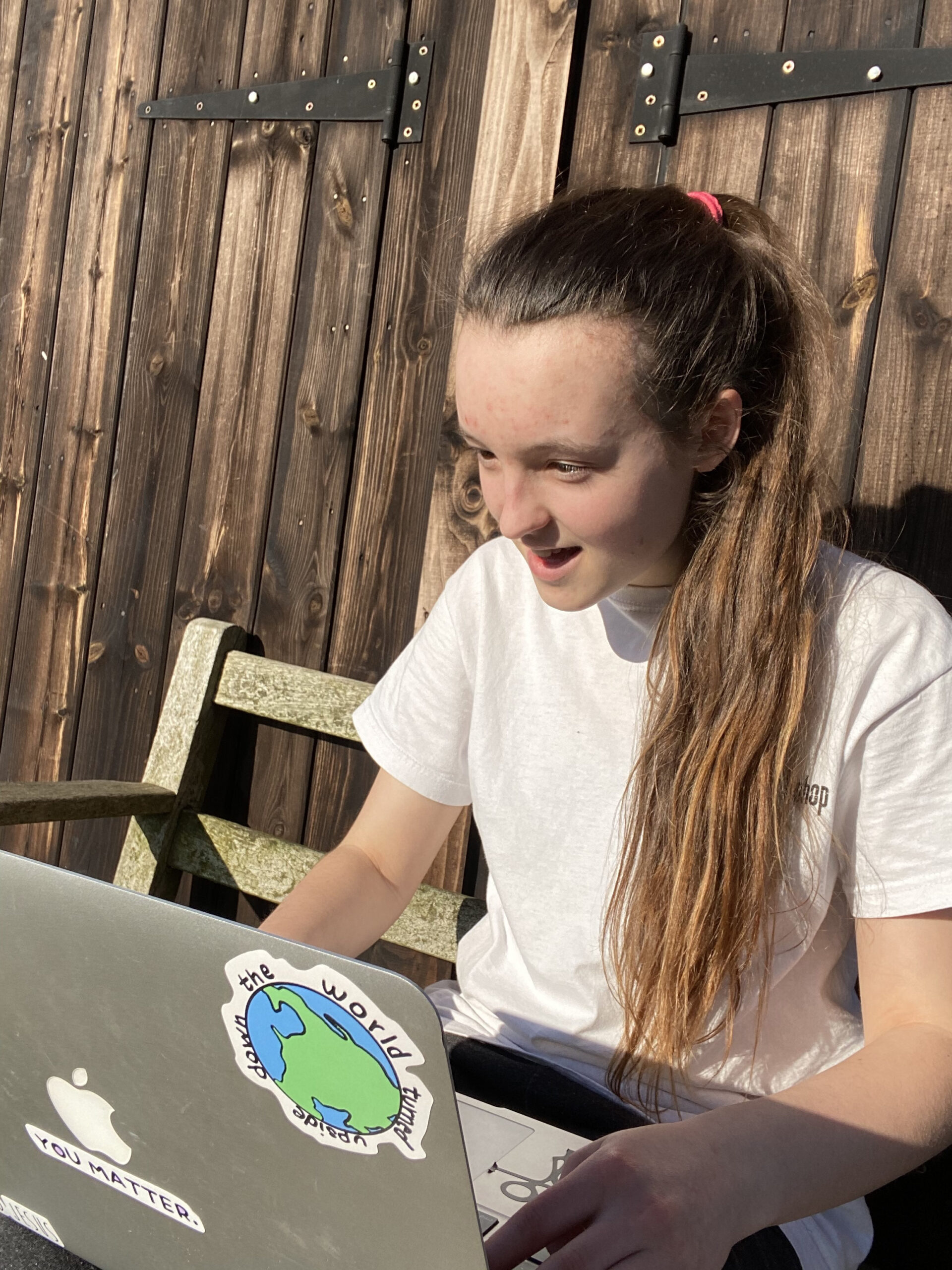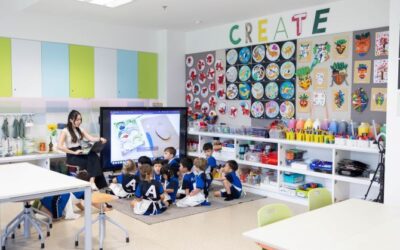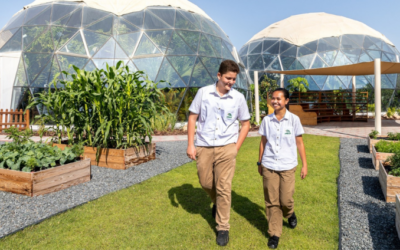Five key benefits of online learning
When it comes to online schooling, those not familiar may worry about their child’s online screen time and lack of socialising opportunities. However, it can actually remove barriers to socialising by encouraging teamwork and creativity, and empowering children to make friends anywhere in the world!
Online learning is growing in popularity, and it’s not surprising with one in three internet users being under 18, and 46% of 16 – 24-year-olds having used online learning materials. Fifteen per cent of people this age have also taken part in an online course.
It is true that online learning is not for every child, but parents concerned with too much screen time being harmful to a learner’s development need to understand that there are in fact many benefits.
The online learning community provides a child with more flexibility, participation in active learning, opportunities to socialise on- and off-screen, and fewer distractions.
Regular breaks and time away from the screen during the schooling day are also encouraged.
Flexible Learning That Can be Tailored to Every Child’s Individual Needs
Live lessons are an important part of online learning, and give students the opportunity to interact with their teachers and peers, but one of the crucial benefits is that these
lessons can be recorded. Recordings are then uploaded to a central student platform where learners can view them at any time, from anywhere, giving them flexibility to study whenever and wherever suits them. Equally, if they’re not well enough to attend a live lesson, or if they have commitments outside of education, they can catch up with lesson recordings later.

Students with creative or sporting talents often need lots of time for practice and travel. Online schooling allows them to step away from the desk and keep up with their active schedules without compromising their learning.
The likes of actors, musicians, artists and athletes can take part in lessons from anywhere. Brothers Luca, Zak and Freddy Carrick-Smith spend their mornings skiing on the slopes, and afternoons studying.

Above: The Carrick-Smith brothers split their time between the slopes and online learning with King’s InterHigh
Here’s what online student, table tennis player and Commonwealth Games medallist Anna Hursey says about online learning:
“I’m often abroad and would usually be unable to attend mainstream school. If I’m busy with table tennis, I can just go back and listen to the recorded lessons, so I don’t have to miss out on anything.”
The world is changing, and it’s not just students that can make the most of the flexibility of online learning. Families whose parents travel for work or get posted abroad for a length of time, can benefit from being able to stay together and not impede on the child’s education or the parents’ career aspirations.
Active Learning Not Passive
Some online schools use multimedia learning as a big part of teaching programmes. Students can regularly watch peer-reviewed videos, take part in interactive quizzes and listen to audio soundbites.
Many students who study STEM subjects get to apply their skills to real-world projects. This often includes learners working together on assignments. As part of their lessons, students may find themselves planning journeys, making meal plans and creating models.
“ I’m often abroad and would usually be unable to attend mainstream school. If I’m busy with table tennis, I can just go
back and listen to the recorded lessons, so I don’t have to miss out on anything.”
Anna Hursey, Table Tennis Player & Commonwealth Games Medalist
Save the date
The Innovation Festival for Global Working
Join us on 8 June 2023 in Kent, UK
Children can also still be handson through an online school in artistic subjects. They can use the same materials as they would in a traditional school to paint, sculpt or take photos, enabling them to be creative. They then share their work online and receive constructive feedback from students and teachers.
To encourage collaboration, many online schools also have extra-curricular programmes such as theatre clubs, where learners work together to stage virtual plays. This includes rehearsing, recording and editing their performances for peers and parents to watch.
Virtual reality (VR), augmented reality (AR) and simulations are also great tools to enhance the engagement experience for students. Plus, everything being online gives students easy access to a wealth of digital resources, negating the need to set foot into a library which has a limited number of computers and only so many copies of books, journals and other resources. Students are no longer limited to what a physical library has to offer.
Opportunities to socialise, online and offline
Virtual common rooms are a great way for students talk to each other in online schools. They can break into groups and discuss their shared interests, and older learners may also have the opportunity to communicate using a monitored social media platform. Since some online schools, such as King’s InterHigh, are global, this means students can make friends around the world.
The best online schools also have a wide range of clubs and extra-curricular activities for learners to join, giving them plenty of opportunities to pursue new hobbies and make friends. Whether they’re interested in chess, creative writing or debate, a good online school will have lots of options for children to consider.
King’s InterHigh offer opportunities for summer camps, exchange programmes and international conventions, giving students the chance to also meet in person in an exciting and engaging environment. These events allow learners to meet face-to-face with friends they’ve met virtually, and join extra-curricular activities in their local areas.
Families can also get together in online and offline groups, to discuss shared interests and aspirations for their children.
ONLINE LEARNING HAS FEWER DISTRACTIONS
Traditional classrooms can often be distracting, with the pressures to ‘fit in’, and misbehaving students interrupting the learning process.
With online learning, classes are free from distractions and interruptions and students can study from the comfort of their own homes.
When children have days where they must work on commitments outside of education, there is no longer the worry for them to figure out how they will fit everything in and make time for both.
Recorded lessons mean that they can catch up with their classes anytime, from
anywhere, as long as they have an internet connection.
What do students think of this approach? Here’s what actress and online learner Bella Ramsey says: “I get way more out of the lessons because there’s no frustrating distractions or loud unruly classes, you get to sit in the quiet and safety of your own home and learn… It also decreases peer pressure and the desire we all have to fit in to a certain box.”
I get way more out of the
lessons because there’s no frustrating distractions or loud unruly classes, you get to sit in the quiet and safety of your own home and learn… It also decreases peer pressure and the desire we all have to fit in to a certain box.”
Bella Ramsey, Actress & Online Learner
Below: Actress Bella Ramsey


ONLINE LEARNING BENEFITS WITH KING’S INTERHIGH
We know that there’s no ‘one-sizefits-all’ when it comes to learning. That’s why every individual King’s InterHigh student receives a flexible, high-quality education that revolves around their needs and lifestyle. Our expert teachers guide students to learn, grow, and thrive together, with a British and international education designed for online, from Primary to Sixth Form, for ages 7 to 19.
We offer both GCSEs an IGCSEs, providing greater flexibility and the opportunity for international students to achieve their GCSE qualifications no matter where they are in the world.
Alongside the well-regarded British A Levels in our Sixth Form, we were also the first online school to offer the International Baccalaureate Diploma completely online.



